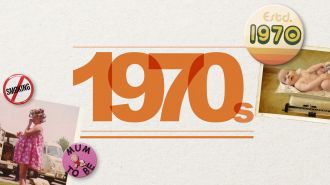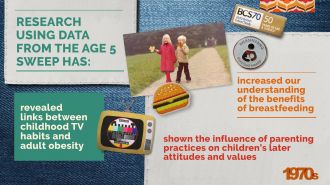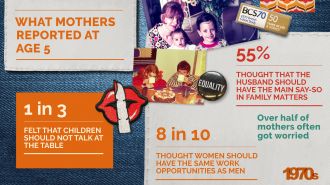- Our studies
- Our research
- Publications and resources
- Data access and training
- About
- News
- Events
- Get in touch
- Join our mailing list
Welcome to our news and blogs section. Here you’ll find the latest developments and insights from across our longitudinal studies.
Growing Up in Digital Europe (GUIDE) is the UK pilot of a major European initiative to create internationally harmonised data for research on child development and wellbeing.

Men are 34% more likely than women to be employed in top jobs at age 42 with overconfidence explaining up to 11% of the gender gap, on average, for full-time workers.

Inequalities in the early cognitive, social and emotional development of children in the UK, which are so important in shaping later life outcomes, have changed little between those born in the early 2000s and those born in the early 2010s. Researchers from the UCL Centre for Longitudinal Studies (CLS) and the Institute for Fiscal Studies […]

Children with severe conduct and hyperactivity problems at school entrance tend to gain lower scores in vocabulary tests during adolescence, according to a new study.

Research using data from the 1970 British Cohort Study (BCS70) has revealed how reading for pleasure can help children excel in English and maths. It has also shown that good reading habits in childhood have a significant longer term impact on people’s vocabulary, with the benefits being evident even 30 years later.

Celebrating 50 years of the 1970 British Cohort Study – So, that was the 1970s. And what a decade it was for Britain’s birth cohort studies. Here’s a whistle stop animated tour of the first 10 years of BCS70.

Celebrating 50 years of the 1970 British Cohort Study – Thanks to findings from the Age 5 Sweep we have increased our understanding of the benefits of breastfeeding, the links between TV viewing and adult obesity, and the influence of parenting practices on children’s later attitudes.

Celebrating 50 years of the 1970 British Cohort Study – During the Age 5 Sweep, mothers were asked a series of questions about their opinions, maternal depression and their child’s behaviour.

Celebrating 50 years of the 1970 British Cohort Study – Few pieces of longitudinal research have had such an impact on government policy as Leon Feinstein’s analysis of BCS70, which examined the links between family background and children’s cognitive development.

The gap between children with the highest and lowest socio-emotional skills has increased over the past three decades, and the socio-economic status of mothers is a significant contributing factor, according to a new UCL study.
In honour of the 50th anniversary of the 1970 British Cohort Study, this scientific conference will showcase the latest cutting-edge research using CLS cohort data.

Over the years, men who waited until their mid-20s to have their first child tended to report the best health in middle age, compared to those who started a family earlier. But, more recently, those who delayed fatherhood until their mid-30s appeared to be the healthiest in midlife.

Children whose mothers smoked during pregnancy are not born predisposed to smoking through absorbing nicotine in the womb, a study has found.
Ryan Bradshaw
Senior Communications Officer
Phone: 020 7612 6516
Email: r.bradshaw@ucl.ac.uk